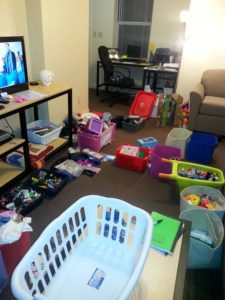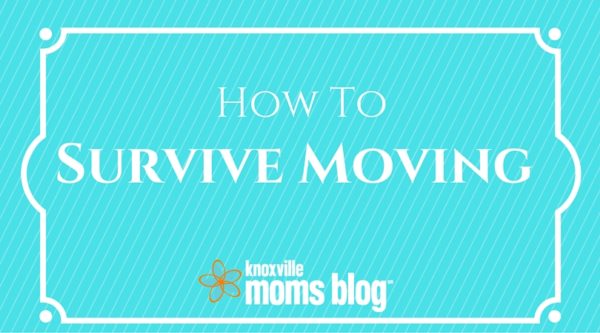In the last year, my family of five has moved six times. We’re not crazy, but a series of life circumstances kept us in a constant state of relocating. Each time required a serious plan, not only for how to get it done, but for what would be going with us, and what would be left behind or put in storage. Here is a list of what I’ve learned:
Packing Up and Moving Out
Double the amount of time you think you need – Take a walk through your house. Take into consideration how much packing assistance you have. Estimate how long it will take you to pack. Then double that amount of time, and put it in your calendar.
Schedule a garage sale – Before you even start packing, get a garage sale date on the calendar. This will give you a target to hit. Ask friends if they’d like to do a joint sale – the bigger the sale, the more traffic you’ll get. Plan to donate EVERYTHING you don’t sell. f you were ready to get rid of it, don’t keep it.
Do it all at once – Packing in spurts is great in theory, and difficult in reality. Set aside what you really need to leave out, and pack an entire room at once. Same goes for decorations, wall hangings and pictures – do these all at once, so that you can get in a rhythm of wrapping and protecting these breakable items.
Buy extra of all moving supplies – Almost everything is returnable as long as it is unopened. Buying a ton of materials up front will keep you from running to and from the store, which costs more time and money.
Keep your receipts – Find somewhere to keep every single receipt. When you get home from any store, before you unload anything, put your receipt in this location. It will come in handy when you start doing returns or exchanges.
Budget for eating out – Despite best intentions, packing and unpacking will eat into meal prep time. Set aside some funds for eating out or ordering in, to alleviate the “money flying out the door” feeling.
Baggies are your best friend – Use these to keep small items together, such as nails or screws to a specific item. They are see-through, can be easily labeled, and you can use packing tape to adhere them to whatever they belong. For our bunk bed, we put all of the small pieces plus the matching key tools in one baggie and taped it to the bed frame.
Organize as you pack – Use packing as an excuse to purge. Moving things you don’t need or use costs more time and money. Designate four areas for the following: trash, keep, donate, and sell. As you pack your belongings, group items together as they’ll be used or needed in the new house.
Pack furniture last – You will want to unload your furniture first, so pack it into the truck last.
Label things that are meant to stay in storage – If you have a box of mementos that you know will stay packed, even after you move, label it. This will be one less box to open and re-tape when you arrive at your new home.
Make an “immediate” need kit – When you arrive at your new home, there are a few items you’ll need immediately. Create one box with the following items, and put it where you can get to it quickly.
- Bed sheets
- One towel and washcloth per family member
- Basic tool kit: hammer, flat head screwdriver, Philips head screwdriver, pliers
- Cleaning kit: multi-purpose spray, dishwasher detergent/tabs, dish soap, paper towels, garbage bags
- Bathroom supplies: toilet paper and at least one bottle of hand soap
- Paper napkins, paper plates and plastic silverware, enough to get through a day or two
Unpacking and Moving In
Schedule a special garbage pickup – Check with your provider on any special needs for a large pickup.
Unload into the proper rooms – Unpack and roughly place your furniture first. Then, as you unload your boxes, place them into the room they will be unpacked in. This will save you countless time and energy. Designate a space for the boxes that will stay in storage.
Unpack everything before you buy new things – You can survive a day or two without a shower curtain, and good chance is, you packed it somewhere.
More piles – Even with all of your prep work, you will find items as you unpack that you do not need. Keep two boxes handy: a return box and a donate box.
Keep a list – Find a common sheet of paper or app that everyone helping you unpack has access to. Have them add needed items to it as they unpack.
Do you have any tips to add? Share with us by leaving a comment!





















When a moving company contacts you about your upcoming move, one need to be prepared. Different movers have different processes for providing quotes. Some movers may want to see all your possessions in-person before offering a quote. Some movers may want to see all your possessions in-person before offering a quote. For large or long distance moves, one should recommend getting an in-home estimate because this usually results in the most accurate quote. Don’t be afraid to get quotes from multiple moving companies and explore all of your options before making a solution. My friend has recently moved to a new place with the help of (http://www.movingrightalong.com/moving.html)movers New York city. He was very happy about their services and friendly nature. He was very happy to make the right choose for the correct one with less budget and accurate best quality services.